The statements made by French President Macron regarding the Taiwan issue continue to be a controversial topic in Europe. The government in Paris defends Macron’s words, while critics accuse him of naivety, vanity, or ignorance of Taiwan’s precarious situation. Whether intentional or not, Macron has sparked a debate about a unified China policy for the EU, which ultimately affects Europe’s future relationship with the United States. Opinions on all of this are still widely divergent, as our editorial team has analyzed based on comments from Poland and Hungary.
German Foreign Minister Baerbock is now under pressure to ensure European clarity during her upcoming visit to Beijing. A few days later, EU foreign policy chief Josep Borrell will also visit Beijing. The German government is acting cautiously in this complex situation, as Stefan Braun analyzes. On the one hand, Berlin and Baerbock must express the EU’s solidarity with beleaguered Taiwan in Beijing. However, harsh criticism of Macron would be seen in Beijing as German-French squabbling. And that, in turn, is exactly the impression that must not be created.
Meanwhile, in China, a hero of the Mao era is being celebrated under Xi Jinping’s rule. The model soldier Lei Feng, who died young in an accident in 1962, was the main character in campaigns for more decency, idealism and revolutionary zeal among communist cadres for decades. Now, Lei is being used for Xi’s “New Era,” as analyzed by Fabian Peltsch. State media articles praise the model soldier, and a musical about his life is in the works. However, young Chinese people tend to look to influencers rather than long-deceased role models.
Florian Mausbach experienced the heated end of the Mao era firsthand. He was working as an official text translator in Beijing at the time. You can read about how Mausbach coined the term “gang of four” to describe Mao’s widow’s radical group in today’s Heads.
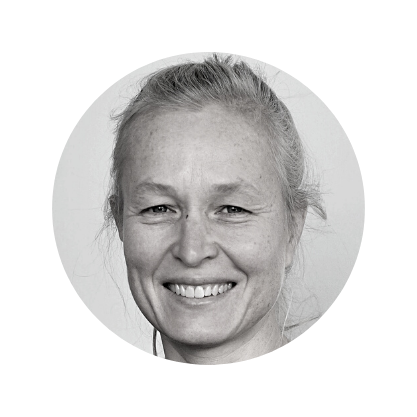
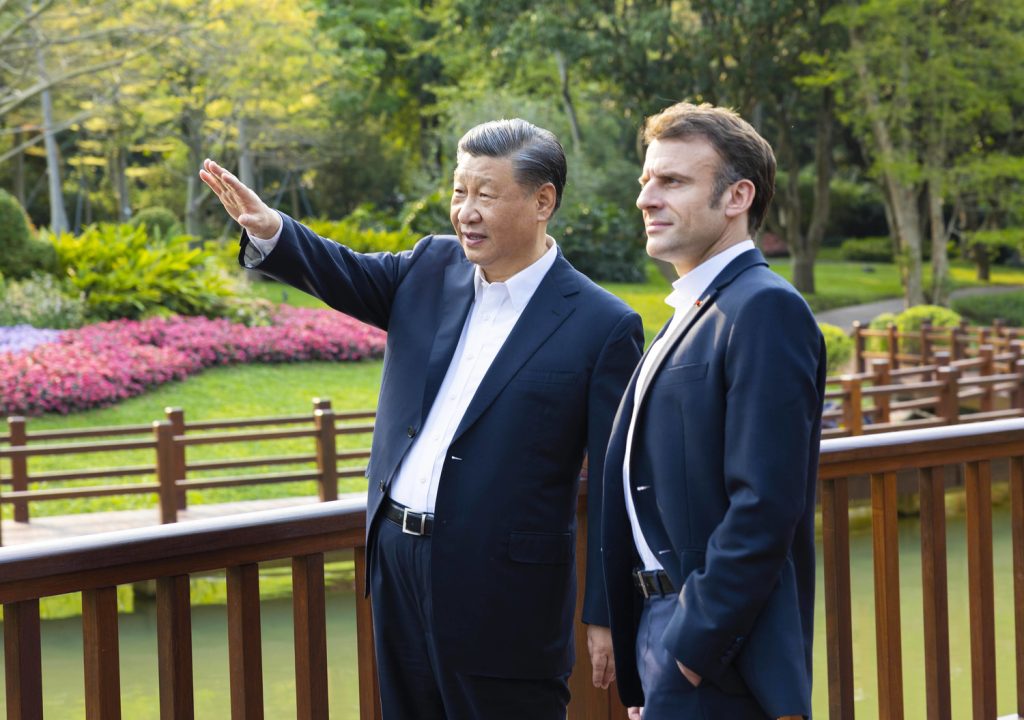
Much ado about nothing? In an interview with the French newspaper Les Echos during his trip to China, French President Emmanuel Macron called for Europe to act more independently in the Taiwan conflict. At the same time, Macron hinted that Europe might not stand by Taiwan in the event of an attack by the People’s Republic. “The worst thing would be to think that we Europeans must become followers on this topic and adapt to the American rhythm and a Chinese overreaction,” Macron said. Now there is outrage in Berlin and Brussels. And yet only in part.
“Macron is isolating himself in Europe, he is weakening the European Union, and he is indeed counteracting what the president of the European Commission said in Beijing,” CDU foreign affairs expert Norbert Röttgen criticized on Deutschlandfunk radio. His party colleague Manfred Weber, chairman of the European People’s Party (EPP) in the EU Parliament, was also appalled. The EU states made themselves untrustworthy “if on the one hand, you demand sovereignty for Europe and then conclude every economic deal you can with China,” he tweeted. Longtime EU parliamentarian Reinhard Buetikofer of the Green Party used the hashtag “#braindead” on Twitter.
While Macron, with 50 entrepreneurs in tow, flattered host Xi Jinping during a joint visit with Ursula von der Leyen in Beijing last week, the EU Commission president chose more cautionary words: Should China support Russia “directly or indirectly” with military equipment, this would “severely strain” relations with the EU. She described a possible Chinese attack on Taiwan as an unacceptable course of action.
The government in Paris, however, vehemently rejected the criticism of its president on Tuesday. Macron has repeatedly said that France is not equidistant from the US and China, a spokesperson for the Élysée Palace said, fending off accusations of equidistance: “The US is our ally, we share common values.” China, on the other hand, is a partner, competitor and systemic rival with whom they want to create a common agenda to reduce tensions and address global issues, they said. On Taiwan, France supports the status quo, they stressed. Macron, they said, had clearly told China’s leader Xi that the Taiwan issue must be resolved through dialogue.
In Brussels, meanwhile, efforts were made on Tuesday to limit the damage. The joint message of Macron and von der Leyen in the trilateral meeting with Xi was quite “consistent and coherent,” stressed EU Commission spokesman Eric Mamer. As far as the rest of the French leader’s trip or his interview statements on Taiwan are concerned, the EU Commission will not comment – as is generally the case.
Von der Leyen had spoken during her trip in the capacity of EU Commission president and had presented a unified line here compared to the keynote speech a week earlier, Mamer said. There had been coordination with the Élysée before this speech as well as before the joint trip. Since the publication of the Macron interview, however, there has so far been no contact between the offices of the EU Commission chief and the French head of state, Mamer explained.
But some in France also view Macron’s interview critically. Von der Leyen and Macron certainly discussed the Taiwan issue during their meeting before their joint trip, said French China watcher Antoine Bondaz. The problem, he said, is that Macron has failed to present an agenda that defines the EU’s interests and strategy. “Saying we don’t have the same interests as the US is obvious,” Bondaz criticized. “And distancing ourselves from the US is not a strategy in itself.” The timing of Macron’s pronouncements was disastrous, he said.
“It is a statement that has not benefited French policy,” Stéphane Corcuff, a sinologist at Sciences Po Lyon University, told the France 24 news platform. “The only thing that can stop China from attacking Taiwan is the knowledge that we will be there to respond,” Corcuff said.
Nevertheless, Washington reacted calmly. There is an “excellent” bilateral relationship with France, said John Kirby, spokesman for the US Security Council. President Joe Biden has a good personal relationship with Macron, he said, and the two work closely together on various issues – including Asia.
EU Green politician Buetikofer has his own reading: Macron had actually not intended to talk about the subject of Taiwan on his Beijing trip, on the grounds that he was a stoic and would only talk about the things he could talk about. Élysée circles also said before the trip that the topic of Taiwan would not be actively addressed.
The fact that he then did get carried away was a success for the Chinese side, who showered him with attention, which he then self-indulgently fell victim to, Buetikofer says. “Macron’s unspeakable remarks were a mixture of one-third tending toward anti-American French tradition, 15 percent fatigue and, above all, a lot of arrogance.”
To what extent has Macron harmed Taiwan with this? “Not so much in effect,” Buetikofer answers. Macron had given the debate on Taiwan a boost and, at the same time, marked a position that not many in Europe would find easy to follow. “Macron’s remarks have once again highlighted the need to come to a common European position in support of Taiwan.”
So now Europe is faced with the need to conduct the debate that should ultimately result in a common position. Poland’s Prime Minister Mateusz Morawiecki stressed Tuesday before leaving for the United States that the alliance with the United States “will be the top priority of upcoming Presidency of the EU Council. It is the foundation of our security.” Poland will take over the presidency of the EU Council in early 2025. Other tones came – unsurprisingly – from Hungary. The EU must “finally wake up” to its own interests and not simply follow the US, Balázs Orbán, a close political adviser to Hungarian Prime Minister Viktor Orbán, also wrote on Twitter. He quoted his boss with statements seemingly similar to those of Macron.
Macron, von der Leyen and, from Wednesday, German Foreign Minister Annalena Baerbock are not the only visitors from Europe this week: EU High Representative for Foreign Affairs Josep Borrell is also traveling to Beijing. Borrell is expected there from Thursday to Saturday. Borrell’s visit had been planned for quite some time, a spokeswoman of the European External Action Service (EEAS) assured. After last week, however, his trip is likely to receive special attention. The EU foreign affairs envoy has not necessarily been known for critical language toward China. Observers in Brussels and Beijing will therefore be listening closely to see if he follows his boss von der Leyen. Amelie Richter/Felix Lee
On Tuesday, the German government stayed completely out of the debate about Emmanuel Macron’s statements on Taiwan. This is mainly because it does not want to add fuel to the fire. Whether in Olaf Scholz‘s chancellery or Annalena Baerbock‘s foreign office, everyone knows that a public contradiction of the French president’s statements would be exactly what Beijing wants: an EU at odds with itself, whose most important members can be played off against each other.
It is true that some of Macron’s formulations are not well received by the German government. This applies above all to his distancing from Taiwan. Nevertheless, the leadership of the traffic light coalition does not want to begrudge the Chinese leadership this triumph.
However, the German government has a very immediate chance to straighten out Macron’s remarks in Beijing. Baerbock is planning a visit to China starting on Wednesday. The Green politician is expected to signal that the Europeans are not indifferent to the conflict over Taiwan. “Foreign Minister Baerbock will have to make the Taiwan position clear during her visit,” demands Nils Schmid, foreign policy spokesman for the SPD parliamentary group. The trip will not be easy.
Perhaps the mission is not as delicate as it may seem at the moment. Beyond his Taiwan sentences, Macron has also conveyed messages that Scholz and Baerbock would also agree with. These include Macron’s plea for a strong, self-confident Europe. The concern here is for a future after the time of US President Joe Biden. Defense Minister Boris Pistorius expressed this not much differently in a recent interview.
The government’s reticence, however, does not mean that everyone in Berlin was happy with Macron’s interview. SPD foreign policy expert Schmid said that “it was unfortunate”. “Certainly, it was well-intentioned on his part, but it went wrong.” For all his understanding of mishaps, Schmid is critical of Macron’s words on Taiwan. “What is clear is that we are on the side of democracy in Taiwan.” There should be no violent changes here – and no distancing either, he said. “If he says that we Europeans have to stay out of it, that’s problematic.”
Schmid’s view of EU Commission President Ursula von der Leyen is remarkable. Her visit to Beijing should have gone differently. “Suddenly, she had disappeared from the scene.” Moreover, the Chinese protocol had done everything to ensure that von der Leyen did not appear. However, this was not a clever move on the part of the Chinese. In the end, it will be the EU that decides on trade issues, not Macron.
Green Party foreign affairs expert Juergen Trittin warned against damaging relations with the current US administration in particular. “A strong transatlantic partnership is in Europe’s interest.” It is important to strengthen Europe’s sovereignty and resilience without losing sight of good relations with the United States, Trittin said. “With the Biden administration, US-European relations have improved again.” He said that was evident in the joint support for Ukraine. The EU and the US are also currently cooperating closely in other fields, he said.
Conversely, however, Trittin also views excessive proximity to the US with unease. The Green politician points out that Europe should not orient itself “to the vagaries and inconsistencies of China’s positions in the US Congress.” “Here, the one-China policy is increasingly being questioned along with the growing risk of escalation. This is not in the interest of Europe, Japan, Korea or the ASEAN states.” Trittin, like Pistorius, also fears that good relations with Washington could come to an abrupt end with the next presidential election. “Macron was right to point that out.” Collaboration: Horand Knaup/Franziska Klemenz
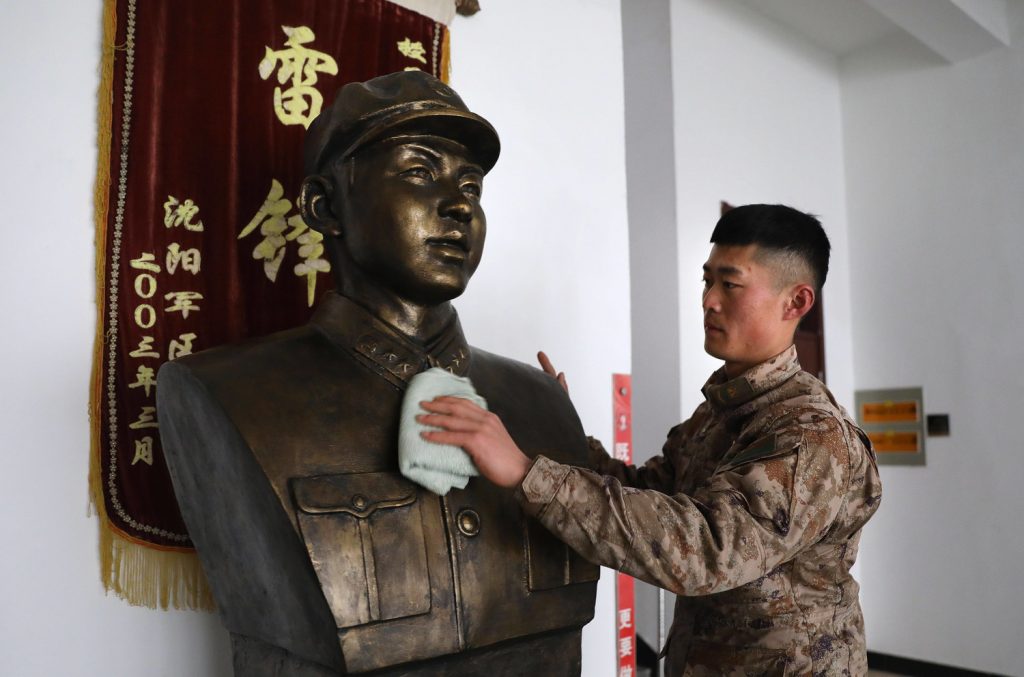
In March 60 years ago, Mao Zedong canonized a young Chinese man in the state newspaper People’s Daily. The people, Mao said, must henceforth learn from “Comrade Lei Feng,” who, as a young tractor driver and soldier in the People’s Liberation Army, had been killed by a telephone pole less than a year earlier. Lei Feng’s selflessness toward his comrades and his revolutionary spirit had been exemplary, Mao explained. The 22-year-old’s diaries, published posthumously, were soon declared required reading by the Party. Lei Feng’s self-sacrifice, celebrated by Mao, is reflected there in sentences like this: “I have only one wish in my heart. I want to devote myself wholeheartedly to the Party, socialism and communism.”
Photos from the life of the model soldier also circulated. There, for example, the orphan boy was seen studying Mao’s writings in the perfectly lit cab of a truck during a break in his work. Today, in a museum in Lei Feng’s adopted hometown of Fushun, his sandals and toothbrush can be admired under glass.
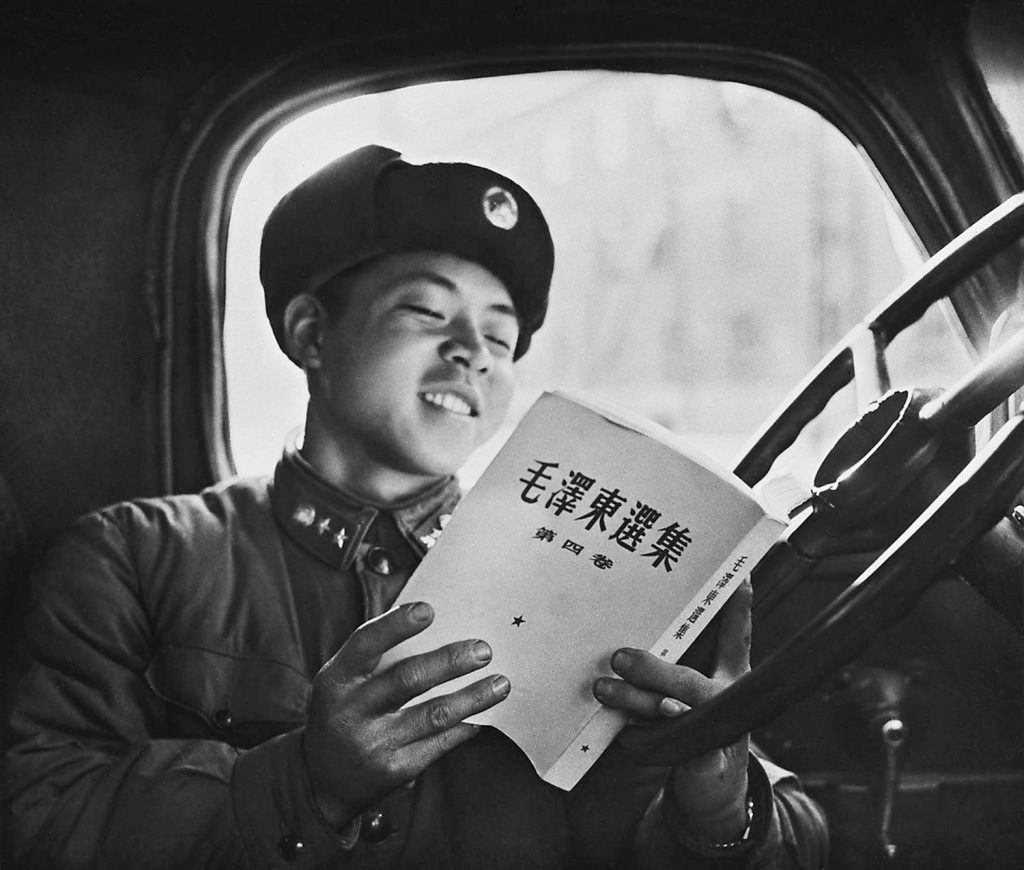
Sinologists doubt, however, whether the young man really existed. However, it is still not allowed to say so in China, explains Robert Weatherley, a political scientist at Cambridge University, who has studied Lei Feng’s role as a propaganda tool in depth. “People think he existed, but most people don’t believe the content of his diaries, realizing that they were most likely written by the CCP after Lei’s death,” Weatherley tells China.Table.
Sixty years after his supposed demise, the party once again wants to breathe life into its veteran poster child. A few weeks ago, China’s state media quoted Xi Jinping as saying it was more important than ever to “deeply understand Lei Feng so that his spirit shines even brighter in the new era“. To mark the official “Learning of Lei Feng Day” (学雷锋纪念日) on March 5, a new series of stamps featuring his likeness was released in China. A new musical is in the works that will once again review the stages of his short life. In Shenzhen and Inner Mongolia, Lei Feng buses lined with his images and sayings took to the streets.
The whole thing was flanked by countless articles in the state media. These even portrayed a Bangladeshi student living in China who had founded a “Lei Feng International Volunteer Association” in order to “spread the Lei Feng spirit worldwide. Numerous schools and communities also paid tribute to the model soldier with celebrations and charity events. In the city of Shangrao in Jiangxi, some students overshot the mark by performing a “red loyalty dance” in the Red Guard parade. Not only older Chinese might have had bad memories of all this.
Sometimes the cult of Lei Feng takes on rather strange forms: In 2019, a branch of the American fast-food chain KFC in Lei Feng’s hometown of Changsha decorated its walls with a best-of of his life, including diary excerpts and cartoon displays. In 2014, pictures of a young Lei Feng fanatic who had undergone several plastic surgeries to look as much like his idol as possible made the rounds.
But how has this stale propaganda figure lasted so long in the first place? “Lei has had innumerable comebacks over the years,” says Weatherley, who is currently working on a book about Lei Feng’s influence. “Usually when the central government feels that the moral fabric of Chinese society may be in decline and might need a ‘socialist, altruistic’ boost.”
The first Lei Feng campaign began when China was recovering from Mao’s disastrous Great Leap Forward and the resulting famine. And even shortly after the 1989 Tiananmen demonstrations, the CP dug out Lei Feng. “But no one on the street took this particularly seriously,” Weatherley says.
Even the young people who demonstrated against Beijing’s heavy hand with A4 paper last winter are likely to be rather immune to Lei Feng’s moral charisma. And apolitical Chinese their age are now more likely to take live streamers as role models than helpful tractor drivers anyway. “I don’t really think the government has much faith in the power of Lei Feng anymore,” Weatherley then sums up. “I think it is just a reminder to the people that the government is a socialist government, something that is easy to forget after more than 40 years of economic reform.”
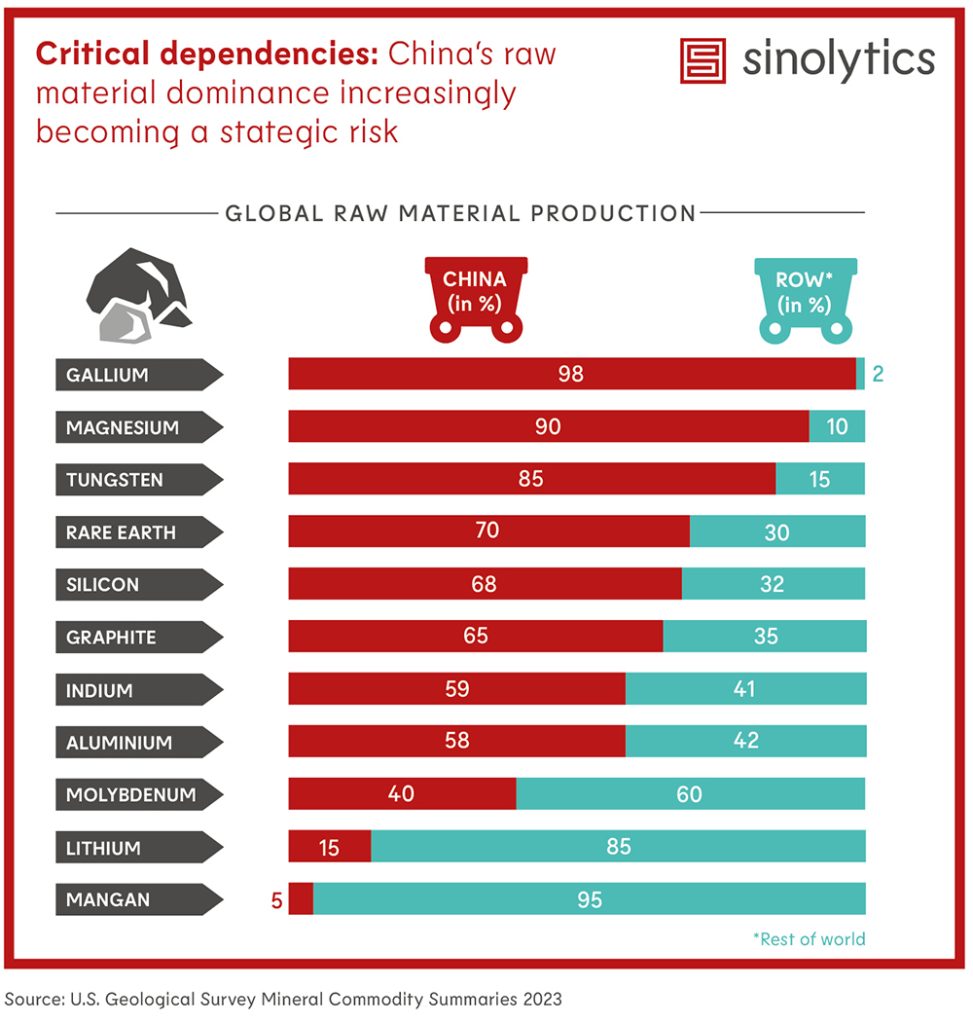
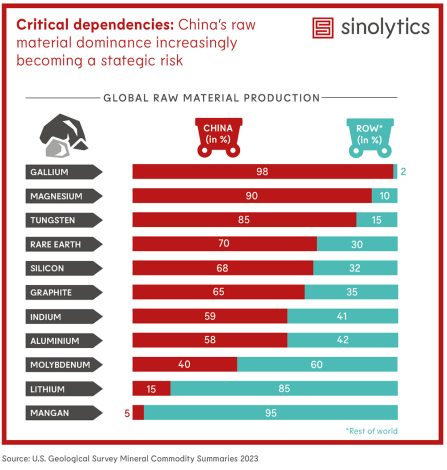
Sinolytics is a European research-based consultancy entirely focused on China. It advises European companies on their strategic orientation and concrete business activities in the People’s Republic.
Starting today, Wednesday, Brazilian President Luiz Inácio Lula da Silva will catch up on his state visit to China, which was postponed a few weeks ago due to pneumonia. Lula will be accompanied by a larger delegation of regional politicians and business representatives. The government in Brasilia expects to sign some 20 bilateral agreements, including an agreement to build a new line of the CBERS-6 joint satellite model.
Lula will first make appointments in Shanghai on Thursday, including the inauguration of his political confidante Dilma Rousseff as the new head of the multilateral Brics bank. On Friday, the 77-year-old is scheduled to meet with President Xi Jinping and Premier Li Qiang in Beijing. Shortly before departure, Lula already announced a return invitation to Xi on state broadcaster EBC. He plans to “consolidate” relations with China, Lula said, according to Reuters. “We want the Chinese to make investments to create new jobs and new production facilities in Brazil.” China is also Brazil’s most important trading partner. Lula wants to broaden the range of his country’s exports, which so far have consisted mainly of soybeans and raw materials.
Another focus will be the Ukraine war. Shortly before his trip, Lula had floated the idea of a kind of “peace club” of countries willing to mediate. Lula hopes to convince China to participate in mediation, Foreign Minister Mauro Vieira told reporters. By the time Lula returns to Brazil, a group of mediating countries will have been “created,” Vieira said. More broadly, Lula is seeking to restore Brazil to a greater role on the geopolitical stage-after a period of isolation under his right-wing predecessor, Jair Bolsonaro. ck
The situation remained tense the day after the official end of China’s major naval maneuver around Taiwan. “Currently, eight ships are still operating in waters around Taiwan,” the Ministry of Defense in Taipei announced Tuesday morning. Later, another ship was discovered. In total, nine of the twelve People’s Liberation Army warships involved in the maneuver were thus still near Taiwan. Also, 26 fighter jets have crossed the median line between Taiwan and mainland China, according to ministry data. China’s navy had practiced encircling all of Taiwan and blocking shipping between Saturday and Monday evening.
On Tuesday, an Italian parliamentary delegation, therefore, decided at the last moment to postpone a trip planned for this week due to “international tensions” and the “friction situation” between China and Taiwan. Meanwhile, Japan’s Nikkei Asia magazine reported that 25 US defense companies are sending representatives to Taiwan in early May. There, they plan to explore joint production of drones and munitions with local defense firms. The group will also meet with President Tsai Ing-wen, Nikkei reported, citing US Taiwan Business Council President Rupert Hammond-Chambers.
Meanwhile, on Tuesday, the US and the Philippines launched their largest bilateral military maneuver in the South China Sea in more than 30 years. This time, 17,600 military personnel are taking part in the annual Balikatan maneuver, twice as many as a year ago. The exercise, held partly with live ammunition, focuses on maritime security and amphibious operations, it said. Experts do not expect a stronger-than-average reaction from Beijing. “US-Philippine military cooperation should not interfere in disputes in the South China Sea,” Foreign Ministry spokesperson Wang Wenbin said on Monday. On the same day, the guided-missile destroyer USS Milius had transited waters claimed by Beijing near the Spratly Islands as part of the US freedom of navigation operation. ck
The Cyberspace Administration of China (CAC) has presented a set of rules for novel generative AI services in the style of ChatGPT. With this, Beijing aims to make providers of the fast-growing technology more accountable before releasing it to the market. Generative AI uses machine learning to create new content, for example, from existing text, audio files and images.
Accordingly, platforms must ensure that they respect intellectual property and that their content is accurate, does not discriminate, and does not compromise security. Operators must also clearly label AI-generated content as such, the Internet regulator said on its website. The regulator also said platforms must verify users’ identities so that usage can be tracked. “Content generated by generative artificial intelligence shall embody core socialist values and shall not contain content that undermines state power, advocates the overthrow of the socialist system, calls for the division of the country or undermines national unity,” the CAC regulations said.
Global interest in generative AI has skyrocketed since ChatGPT’s debut in late 2022. While ChatGPT, developed by US-based OpenAI and heavily co-funded by Microsoft, is not available in China. However, Chinese tech companies such as SenseTime, Tencent, Alibaba and Baidu are already working on similar services. Baidu’s Ernie platform is considered the most advanced. According to experts, however, it will not be able to catch up with ChatGPT for the time being. fpe
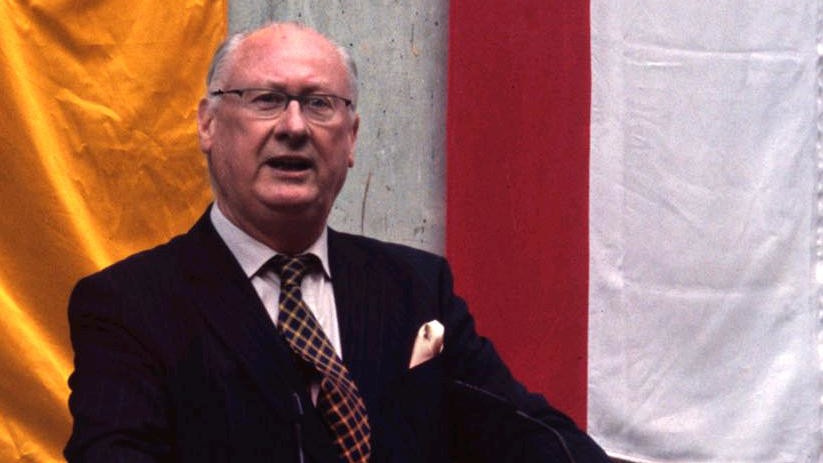
Florian Mausbach was in Beijing at the end of the 1970s when China hesitantly opened up to the world after the fall of Mao’s widow Jiang Qing’s gang of four. What the former president of the Federal Office for Building and Regional Planning took away from it are vivid memories, a well-stocked photo album and a realization: “The Chinese want democracy if you let them.”
The souvenirs from China are neatly sorted on the dining table when Mausbach welcomes China.Table for a talk. They transport us on a journey through time to 1976: Mausbach’s path from city planner in Dusseldorf to translator in Beijing. Together with his wife Ursula, he translates texts into German for Waiwenyu (外文语), a Beijing publishing house for foreign-language literature. Mausbach, who considers himself a left-wing “revolutionary” at the time, is fascinated by China’s socialism from afar. Add to that a dash of adventurousness: “We thought, before we start a family, we want to experience something,” Mausbach recalls.
After entering the country, he immediately notices the mourning for Premier Zhou Enlai, who had just died. And the attempts in Mao Zedong’s radical environment to limit Zhou’s legacy and the leeway of his liberal comrade-in-arms Deng Xiaoping. For Mausbach, this was a moment of disappointment: “We realized what kind of dictatorship we had ended up in,” he recalls. Because in the spring of 1976, Deng Xiaoping became the victim of a smear campaign that also reached Mausbach’s workplace: The publishing boss ordered the staff to join in the criticism of Deng with wall posters – the so-called Dazibaos (大字报).
After a restless night, Mausbach decides to join in. What his boss does not expect: The guest from West Germany takes on China’s radical left by choosing a particular Mao quote: “You should unite and not be divisive! Be open and honest and don’t engage in conspiracies and intrigues.” The poster causes quite a stir – but makes Mausbach and his wife very lonely for the time being in the heated atmosphere. The fact that his poster could have had worse consequences for his wife and him didn’t matter to Mausbach. “We didn’t think about it, we were just sixty-eighters,” he explains.
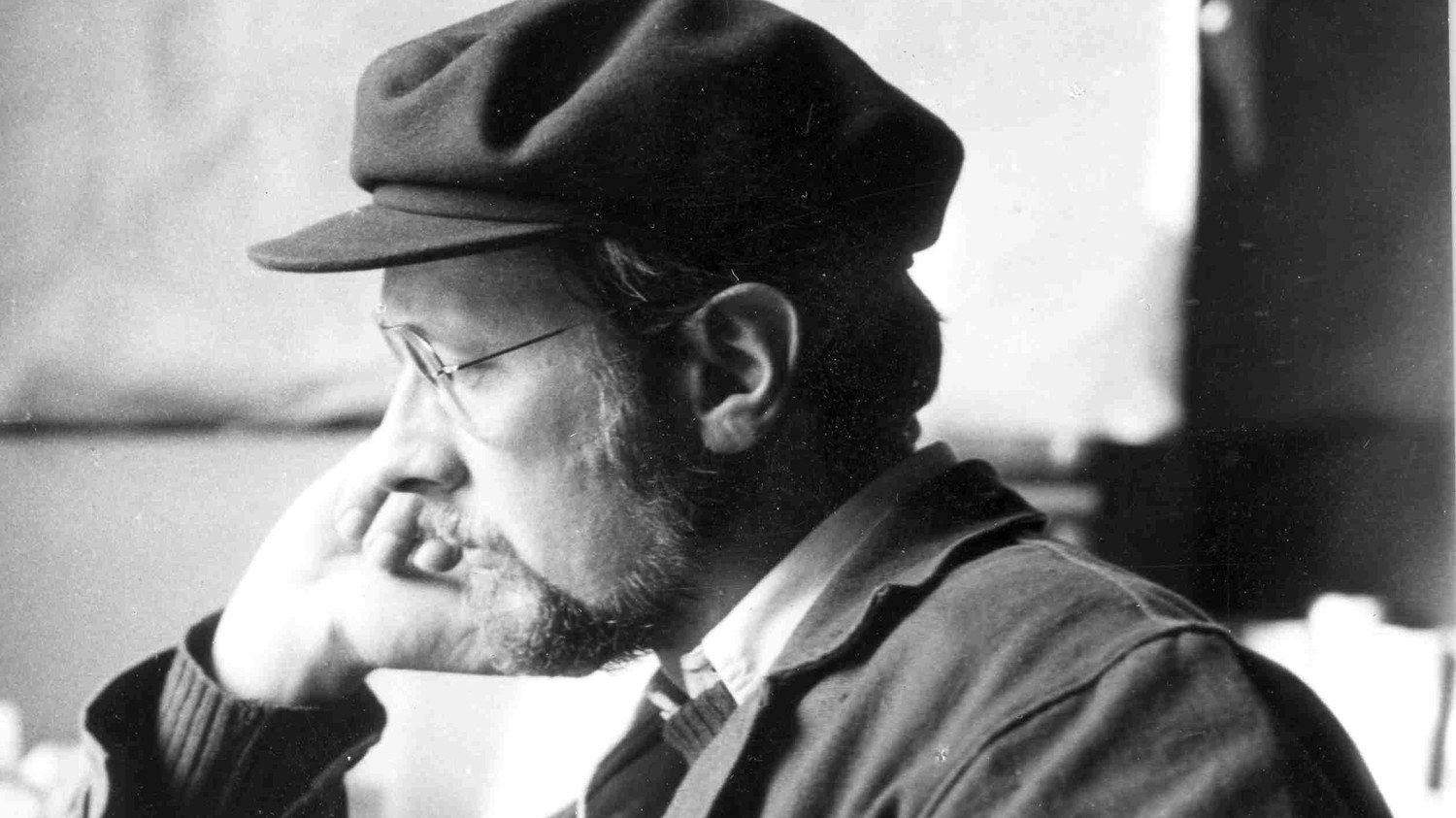
Shortly before Mao’s death in September 1976, Mausbach was summoned to the publishing house at short notice to translate an important article. It is the editorial that, contrary to all expectations at the time, deposes the radical clique around Mao Zedong. The special feature: The article begins with the Mao quote that Mausbach had also already placarded – continues with the sentence, “You shall not form a gang of four. Let it be!” And it is Mausbach who, with his translation of Sirenbang (四人帮) into German, coined the term “Viererbande” (“gang of four”) that we are familiar with.
Deng Xiaoping is rehabilitated shortly afterwards. Before leaving China, Mausbach received a special thank-you, which today, 46 years later, he carefully takes out of a brown envelope: a portrait of Deng Xiaoping with a personal dedication on the back.
Mausbach smiles: The portrait serves him years later as a visa substitute for re-entering China. As President of the Federal Office for Building and Regional Planning from 1995 to 2009, he is responsible, among other things, for the construction of the German Embassy in Beijing and the nearby embassy school – and thus, once again, a welcome guest in China.
By this time, however, the Deng portrait had already ended up back in the envelope because its hero from back then had had peaceful student protests in Beijing violently suppressed in 1989. For Mausbach, who feels reminded of the protests in 1989 for Zhou Enlai in 1976, this was a terrible development. He is, therefore, all the more pleased that young people protested against the regime in 2022. Today, as then, it is clear to him that the Chinese want democracy, Mausbach says. “But democracy needs many steps.” Jonathan Lehrer
Olaf Korzinovski has been Executive Vice President at Volkswagen China Investment since April. Based in Beijing, his responsibilities include logistics, components and quality assurance. Between 2014 and 2018, Korzinovski already served as technical manager for VW in Tianjin.
Detlef Dumke has taken over as Head of Brand Product Line at the FAW-Volkswagen joint venture in Changchun. Dumke has worked for VW for 35 years. Between 2011 and 2016, he worked for the automaker in Shanghai as a product manager and in controlling.
Is something changing in your organization? Let us know at heads@table.media!
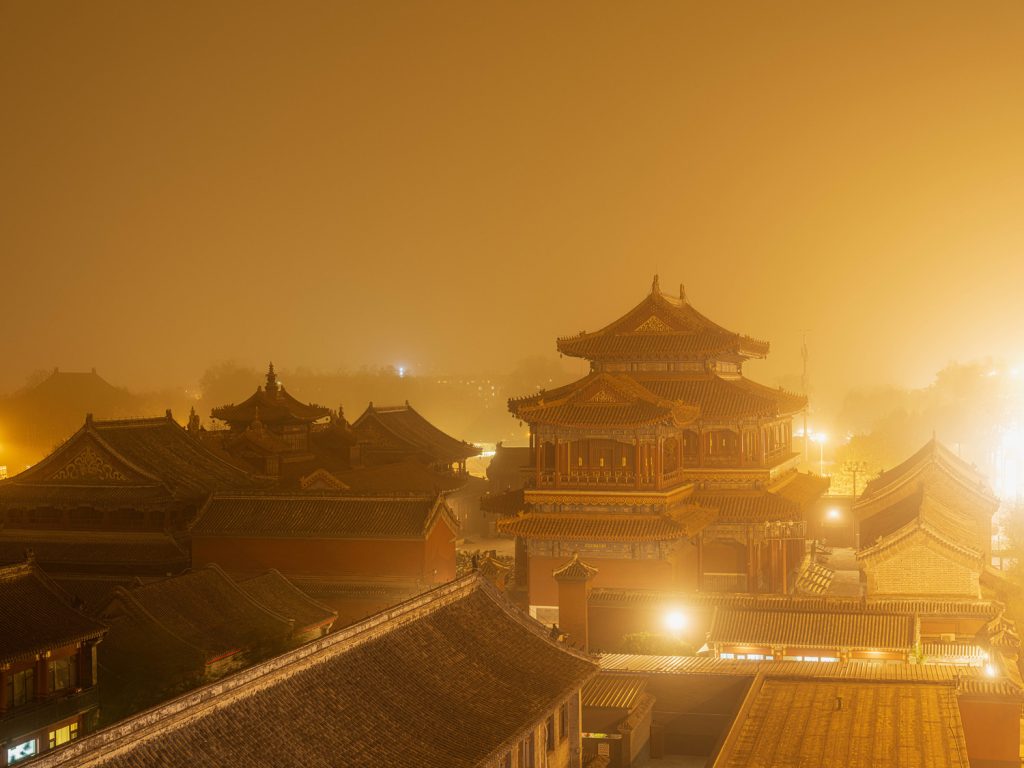
Anyone who has spent any length of time in northern China knows the plight: Sandstorms from the deserts of Mongolia and Kazakhstan turn cities like Beijing and Harbin into a nicotine-yellow soup at least once a year. On Monday, it was that time again. Some 409 million people had to brace themselves with masks and tightly closed windows against the weather phenomenon gnashing between their teeth. Beijing’s air pollution index rose well above the scale’s upper limit to 1300 on Monday evening, and visibility dropped to a few dozen meters, giving sights like Yonghe Temple a spooky aura.
The statements made by French President Macron regarding the Taiwan issue continue to be a controversial topic in Europe. The government in Paris defends Macron’s words, while critics accuse him of naivety, vanity, or ignorance of Taiwan’s precarious situation. Whether intentional or not, Macron has sparked a debate about a unified China policy for the EU, which ultimately affects Europe’s future relationship with the United States. Opinions on all of this are still widely divergent, as our editorial team has analyzed based on comments from Poland and Hungary.
German Foreign Minister Baerbock is now under pressure to ensure European clarity during her upcoming visit to Beijing. A few days later, EU foreign policy chief Josep Borrell will also visit Beijing. The German government is acting cautiously in this complex situation, as Stefan Braun analyzes. On the one hand, Berlin and Baerbock must express the EU’s solidarity with beleaguered Taiwan in Beijing. However, harsh criticism of Macron would be seen in Beijing as German-French squabbling. And that, in turn, is exactly the impression that must not be created.
Meanwhile, in China, a hero of the Mao era is being celebrated under Xi Jinping’s rule. The model soldier Lei Feng, who died young in an accident in 1962, was the main character in campaigns for more decency, idealism and revolutionary zeal among communist cadres for decades. Now, Lei is being used for Xi’s “New Era,” as analyzed by Fabian Peltsch. State media articles praise the model soldier, and a musical about his life is in the works. However, young Chinese people tend to look to influencers rather than long-deceased role models.
Florian Mausbach experienced the heated end of the Mao era firsthand. He was working as an official text translator in Beijing at the time. You can read about how Mausbach coined the term “gang of four” to describe Mao’s widow’s radical group in today’s Heads.


Much ado about nothing? In an interview with the French newspaper Les Echos during his trip to China, French President Emmanuel Macron called for Europe to act more independently in the Taiwan conflict. At the same time, Macron hinted that Europe might not stand by Taiwan in the event of an attack by the People’s Republic. “The worst thing would be to think that we Europeans must become followers on this topic and adapt to the American rhythm and a Chinese overreaction,” Macron said. Now there is outrage in Berlin and Brussels. And yet only in part.
“Macron is isolating himself in Europe, he is weakening the European Union, and he is indeed counteracting what the president of the European Commission said in Beijing,” CDU foreign affairs expert Norbert Röttgen criticized on Deutschlandfunk radio. His party colleague Manfred Weber, chairman of the European People’s Party (EPP) in the EU Parliament, was also appalled. The EU states made themselves untrustworthy “if on the one hand, you demand sovereignty for Europe and then conclude every economic deal you can with China,” he tweeted. Longtime EU parliamentarian Reinhard Buetikofer of the Green Party used the hashtag “#braindead” on Twitter.
While Macron, with 50 entrepreneurs in tow, flattered host Xi Jinping during a joint visit with Ursula von der Leyen in Beijing last week, the EU Commission president chose more cautionary words: Should China support Russia “directly or indirectly” with military equipment, this would “severely strain” relations with the EU. She described a possible Chinese attack on Taiwan as an unacceptable course of action.
The government in Paris, however, vehemently rejected the criticism of its president on Tuesday. Macron has repeatedly said that France is not equidistant from the US and China, a spokesperson for the Élysée Palace said, fending off accusations of equidistance: “The US is our ally, we share common values.” China, on the other hand, is a partner, competitor and systemic rival with whom they want to create a common agenda to reduce tensions and address global issues, they said. On Taiwan, France supports the status quo, they stressed. Macron, they said, had clearly told China’s leader Xi that the Taiwan issue must be resolved through dialogue.
In Brussels, meanwhile, efforts were made on Tuesday to limit the damage. The joint message of Macron and von der Leyen in the trilateral meeting with Xi was quite “consistent and coherent,” stressed EU Commission spokesman Eric Mamer. As far as the rest of the French leader’s trip or his interview statements on Taiwan are concerned, the EU Commission will not comment – as is generally the case.
Von der Leyen had spoken during her trip in the capacity of EU Commission president and had presented a unified line here compared to the keynote speech a week earlier, Mamer said. There had been coordination with the Élysée before this speech as well as before the joint trip. Since the publication of the Macron interview, however, there has so far been no contact between the offices of the EU Commission chief and the French head of state, Mamer explained.
But some in France also view Macron’s interview critically. Von der Leyen and Macron certainly discussed the Taiwan issue during their meeting before their joint trip, said French China watcher Antoine Bondaz. The problem, he said, is that Macron has failed to present an agenda that defines the EU’s interests and strategy. “Saying we don’t have the same interests as the US is obvious,” Bondaz criticized. “And distancing ourselves from the US is not a strategy in itself.” The timing of Macron’s pronouncements was disastrous, he said.
“It is a statement that has not benefited French policy,” Stéphane Corcuff, a sinologist at Sciences Po Lyon University, told the France 24 news platform. “The only thing that can stop China from attacking Taiwan is the knowledge that we will be there to respond,” Corcuff said.
Nevertheless, Washington reacted calmly. There is an “excellent” bilateral relationship with France, said John Kirby, spokesman for the US Security Council. President Joe Biden has a good personal relationship with Macron, he said, and the two work closely together on various issues – including Asia.
EU Green politician Buetikofer has his own reading: Macron had actually not intended to talk about the subject of Taiwan on his Beijing trip, on the grounds that he was a stoic and would only talk about the things he could talk about. Élysée circles also said before the trip that the topic of Taiwan would not be actively addressed.
The fact that he then did get carried away was a success for the Chinese side, who showered him with attention, which he then self-indulgently fell victim to, Buetikofer says. “Macron’s unspeakable remarks were a mixture of one-third tending toward anti-American French tradition, 15 percent fatigue and, above all, a lot of arrogance.”
To what extent has Macron harmed Taiwan with this? “Not so much in effect,” Buetikofer answers. Macron had given the debate on Taiwan a boost and, at the same time, marked a position that not many in Europe would find easy to follow. “Macron’s remarks have once again highlighted the need to come to a common European position in support of Taiwan.”
So now Europe is faced with the need to conduct the debate that should ultimately result in a common position. Poland’s Prime Minister Mateusz Morawiecki stressed Tuesday before leaving for the United States that the alliance with the United States “will be the top priority of upcoming Presidency of the EU Council. It is the foundation of our security.” Poland will take over the presidency of the EU Council in early 2025. Other tones came – unsurprisingly – from Hungary. The EU must “finally wake up” to its own interests and not simply follow the US, Balázs Orbán, a close political adviser to Hungarian Prime Minister Viktor Orbán, also wrote on Twitter. He quoted his boss with statements seemingly similar to those of Macron.
Macron, von der Leyen and, from Wednesday, German Foreign Minister Annalena Baerbock are not the only visitors from Europe this week: EU High Representative for Foreign Affairs Josep Borrell is also traveling to Beijing. Borrell is expected there from Thursday to Saturday. Borrell’s visit had been planned for quite some time, a spokeswoman of the European External Action Service (EEAS) assured. After last week, however, his trip is likely to receive special attention. The EU foreign affairs envoy has not necessarily been known for critical language toward China. Observers in Brussels and Beijing will therefore be listening closely to see if he follows his boss von der Leyen. Amelie Richter/Felix Lee
On Tuesday, the German government stayed completely out of the debate about Emmanuel Macron’s statements on Taiwan. This is mainly because it does not want to add fuel to the fire. Whether in Olaf Scholz‘s chancellery or Annalena Baerbock‘s foreign office, everyone knows that a public contradiction of the French president’s statements would be exactly what Beijing wants: an EU at odds with itself, whose most important members can be played off against each other.
It is true that some of Macron’s formulations are not well received by the German government. This applies above all to his distancing from Taiwan. Nevertheless, the leadership of the traffic light coalition does not want to begrudge the Chinese leadership this triumph.
However, the German government has a very immediate chance to straighten out Macron’s remarks in Beijing. Baerbock is planning a visit to China starting on Wednesday. The Green politician is expected to signal that the Europeans are not indifferent to the conflict over Taiwan. “Foreign Minister Baerbock will have to make the Taiwan position clear during her visit,” demands Nils Schmid, foreign policy spokesman for the SPD parliamentary group. The trip will not be easy.
Perhaps the mission is not as delicate as it may seem at the moment. Beyond his Taiwan sentences, Macron has also conveyed messages that Scholz and Baerbock would also agree with. These include Macron’s plea for a strong, self-confident Europe. The concern here is for a future after the time of US President Joe Biden. Defense Minister Boris Pistorius expressed this not much differently in a recent interview.
The government’s reticence, however, does not mean that everyone in Berlin was happy with Macron’s interview. SPD foreign policy expert Schmid said that “it was unfortunate”. “Certainly, it was well-intentioned on his part, but it went wrong.” For all his understanding of mishaps, Schmid is critical of Macron’s words on Taiwan. “What is clear is that we are on the side of democracy in Taiwan.” There should be no violent changes here – and no distancing either, he said. “If he says that we Europeans have to stay out of it, that’s problematic.”
Schmid’s view of EU Commission President Ursula von der Leyen is remarkable. Her visit to Beijing should have gone differently. “Suddenly, she had disappeared from the scene.” Moreover, the Chinese protocol had done everything to ensure that von der Leyen did not appear. However, this was not a clever move on the part of the Chinese. In the end, it will be the EU that decides on trade issues, not Macron.
Green Party foreign affairs expert Juergen Trittin warned against damaging relations with the current US administration in particular. “A strong transatlantic partnership is in Europe’s interest.” It is important to strengthen Europe’s sovereignty and resilience without losing sight of good relations with the United States, Trittin said. “With the Biden administration, US-European relations have improved again.” He said that was evident in the joint support for Ukraine. The EU and the US are also currently cooperating closely in other fields, he said.
Conversely, however, Trittin also views excessive proximity to the US with unease. The Green politician points out that Europe should not orient itself “to the vagaries and inconsistencies of China’s positions in the US Congress.” “Here, the one-China policy is increasingly being questioned along with the growing risk of escalation. This is not in the interest of Europe, Japan, Korea or the ASEAN states.” Trittin, like Pistorius, also fears that good relations with Washington could come to an abrupt end with the next presidential election. “Macron was right to point that out.” Collaboration: Horand Knaup/Franziska Klemenz

In March 60 years ago, Mao Zedong canonized a young Chinese man in the state newspaper People’s Daily. The people, Mao said, must henceforth learn from “Comrade Lei Feng,” who, as a young tractor driver and soldier in the People’s Liberation Army, had been killed by a telephone pole less than a year earlier. Lei Feng’s selflessness toward his comrades and his revolutionary spirit had been exemplary, Mao explained. The 22-year-old’s diaries, published posthumously, were soon declared required reading by the Party. Lei Feng’s self-sacrifice, celebrated by Mao, is reflected there in sentences like this: “I have only one wish in my heart. I want to devote myself wholeheartedly to the Party, socialism and communism.”
Photos from the life of the model soldier also circulated. There, for example, the orphan boy was seen studying Mao’s writings in the perfectly lit cab of a truck during a break in his work. Today, in a museum in Lei Feng’s adopted hometown of Fushun, his sandals and toothbrush can be admired under glass.

Sinologists doubt, however, whether the young man really existed. However, it is still not allowed to say so in China, explains Robert Weatherley, a political scientist at Cambridge University, who has studied Lei Feng’s role as a propaganda tool in depth. “People think he existed, but most people don’t believe the content of his diaries, realizing that they were most likely written by the CCP after Lei’s death,” Weatherley tells China.Table.
Sixty years after his supposed demise, the party once again wants to breathe life into its veteran poster child. A few weeks ago, China’s state media quoted Xi Jinping as saying it was more important than ever to “deeply understand Lei Feng so that his spirit shines even brighter in the new era“. To mark the official “Learning of Lei Feng Day” (学雷锋纪念日) on March 5, a new series of stamps featuring his likeness was released in China. A new musical is in the works that will once again review the stages of his short life. In Shenzhen and Inner Mongolia, Lei Feng buses lined with his images and sayings took to the streets.
The whole thing was flanked by countless articles in the state media. These even portrayed a Bangladeshi student living in China who had founded a “Lei Feng International Volunteer Association” in order to “spread the Lei Feng spirit worldwide. Numerous schools and communities also paid tribute to the model soldier with celebrations and charity events. In the city of Shangrao in Jiangxi, some students overshot the mark by performing a “red loyalty dance” in the Red Guard parade. Not only older Chinese might have had bad memories of all this.
Sometimes the cult of Lei Feng takes on rather strange forms: In 2019, a branch of the American fast-food chain KFC in Lei Feng’s hometown of Changsha decorated its walls with a best-of of his life, including diary excerpts and cartoon displays. In 2014, pictures of a young Lei Feng fanatic who had undergone several plastic surgeries to look as much like his idol as possible made the rounds.
But how has this stale propaganda figure lasted so long in the first place? “Lei has had innumerable comebacks over the years,” says Weatherley, who is currently working on a book about Lei Feng’s influence. “Usually when the central government feels that the moral fabric of Chinese society may be in decline and might need a ‘socialist, altruistic’ boost.”
The first Lei Feng campaign began when China was recovering from Mao’s disastrous Great Leap Forward and the resulting famine. And even shortly after the 1989 Tiananmen demonstrations, the CP dug out Lei Feng. “But no one on the street took this particularly seriously,” Weatherley says.
Even the young people who demonstrated against Beijing’s heavy hand with A4 paper last winter are likely to be rather immune to Lei Feng’s moral charisma. And apolitical Chinese their age are now more likely to take live streamers as role models than helpful tractor drivers anyway. “I don’t really think the government has much faith in the power of Lei Feng anymore,” Weatherley then sums up. “I think it is just a reminder to the people that the government is a socialist government, something that is easy to forget after more than 40 years of economic reform.”


Sinolytics is a European research-based consultancy entirely focused on China. It advises European companies on their strategic orientation and concrete business activities in the People’s Republic.
Starting today, Wednesday, Brazilian President Luiz Inácio Lula da Silva will catch up on his state visit to China, which was postponed a few weeks ago due to pneumonia. Lula will be accompanied by a larger delegation of regional politicians and business representatives. The government in Brasilia expects to sign some 20 bilateral agreements, including an agreement to build a new line of the CBERS-6 joint satellite model.
Lula will first make appointments in Shanghai on Thursday, including the inauguration of his political confidante Dilma Rousseff as the new head of the multilateral Brics bank. On Friday, the 77-year-old is scheduled to meet with President Xi Jinping and Premier Li Qiang in Beijing. Shortly before departure, Lula already announced a return invitation to Xi on state broadcaster EBC. He plans to “consolidate” relations with China, Lula said, according to Reuters. “We want the Chinese to make investments to create new jobs and new production facilities in Brazil.” China is also Brazil’s most important trading partner. Lula wants to broaden the range of his country’s exports, which so far have consisted mainly of soybeans and raw materials.
Another focus will be the Ukraine war. Shortly before his trip, Lula had floated the idea of a kind of “peace club” of countries willing to mediate. Lula hopes to convince China to participate in mediation, Foreign Minister Mauro Vieira told reporters. By the time Lula returns to Brazil, a group of mediating countries will have been “created,” Vieira said. More broadly, Lula is seeking to restore Brazil to a greater role on the geopolitical stage-after a period of isolation under his right-wing predecessor, Jair Bolsonaro. ck
The situation remained tense the day after the official end of China’s major naval maneuver around Taiwan. “Currently, eight ships are still operating in waters around Taiwan,” the Ministry of Defense in Taipei announced Tuesday morning. Later, another ship was discovered. In total, nine of the twelve People’s Liberation Army warships involved in the maneuver were thus still near Taiwan. Also, 26 fighter jets have crossed the median line between Taiwan and mainland China, according to ministry data. China’s navy had practiced encircling all of Taiwan and blocking shipping between Saturday and Monday evening.
On Tuesday, an Italian parliamentary delegation, therefore, decided at the last moment to postpone a trip planned for this week due to “international tensions” and the “friction situation” between China and Taiwan. Meanwhile, Japan’s Nikkei Asia magazine reported that 25 US defense companies are sending representatives to Taiwan in early May. There, they plan to explore joint production of drones and munitions with local defense firms. The group will also meet with President Tsai Ing-wen, Nikkei reported, citing US Taiwan Business Council President Rupert Hammond-Chambers.
Meanwhile, on Tuesday, the US and the Philippines launched their largest bilateral military maneuver in the South China Sea in more than 30 years. This time, 17,600 military personnel are taking part in the annual Balikatan maneuver, twice as many as a year ago. The exercise, held partly with live ammunition, focuses on maritime security and amphibious operations, it said. Experts do not expect a stronger-than-average reaction from Beijing. “US-Philippine military cooperation should not interfere in disputes in the South China Sea,” Foreign Ministry spokesperson Wang Wenbin said on Monday. On the same day, the guided-missile destroyer USS Milius had transited waters claimed by Beijing near the Spratly Islands as part of the US freedom of navigation operation. ck
The Cyberspace Administration of China (CAC) has presented a set of rules for novel generative AI services in the style of ChatGPT. With this, Beijing aims to make providers of the fast-growing technology more accountable before releasing it to the market. Generative AI uses machine learning to create new content, for example, from existing text, audio files and images.
Accordingly, platforms must ensure that they respect intellectual property and that their content is accurate, does not discriminate, and does not compromise security. Operators must also clearly label AI-generated content as such, the Internet regulator said on its website. The regulator also said platforms must verify users’ identities so that usage can be tracked. “Content generated by generative artificial intelligence shall embody core socialist values and shall not contain content that undermines state power, advocates the overthrow of the socialist system, calls for the division of the country or undermines national unity,” the CAC regulations said.
Global interest in generative AI has skyrocketed since ChatGPT’s debut in late 2022. While ChatGPT, developed by US-based OpenAI and heavily co-funded by Microsoft, is not available in China. However, Chinese tech companies such as SenseTime, Tencent, Alibaba and Baidu are already working on similar services. Baidu’s Ernie platform is considered the most advanced. According to experts, however, it will not be able to catch up with ChatGPT for the time being. fpe

Florian Mausbach was in Beijing at the end of the 1970s when China hesitantly opened up to the world after the fall of Mao’s widow Jiang Qing’s gang of four. What the former president of the Federal Office for Building and Regional Planning took away from it are vivid memories, a well-stocked photo album and a realization: “The Chinese want democracy if you let them.”
The souvenirs from China are neatly sorted on the dining table when Mausbach welcomes China.Table for a talk. They transport us on a journey through time to 1976: Mausbach’s path from city planner in Dusseldorf to translator in Beijing. Together with his wife Ursula, he translates texts into German for Waiwenyu (外文语), a Beijing publishing house for foreign-language literature. Mausbach, who considers himself a left-wing “revolutionary” at the time, is fascinated by China’s socialism from afar. Add to that a dash of adventurousness: “We thought, before we start a family, we want to experience something,” Mausbach recalls.
After entering the country, he immediately notices the mourning for Premier Zhou Enlai, who had just died. And the attempts in Mao Zedong’s radical environment to limit Zhou’s legacy and the leeway of his liberal comrade-in-arms Deng Xiaoping. For Mausbach, this was a moment of disappointment: “We realized what kind of dictatorship we had ended up in,” he recalls. Because in the spring of 1976, Deng Xiaoping became the victim of a smear campaign that also reached Mausbach’s workplace: The publishing boss ordered the staff to join in the criticism of Deng with wall posters – the so-called Dazibaos (大字报).
After a restless night, Mausbach decides to join in. What his boss does not expect: The guest from West Germany takes on China’s radical left by choosing a particular Mao quote: “You should unite and not be divisive! Be open and honest and don’t engage in conspiracies and intrigues.” The poster causes quite a stir – but makes Mausbach and his wife very lonely for the time being in the heated atmosphere. The fact that his poster could have had worse consequences for his wife and him didn’t matter to Mausbach. “We didn’t think about it, we were just sixty-eighters,” he explains.

Shortly before Mao’s death in September 1976, Mausbach was summoned to the publishing house at short notice to translate an important article. It is the editorial that, contrary to all expectations at the time, deposes the radical clique around Mao Zedong. The special feature: The article begins with the Mao quote that Mausbach had also already placarded – continues with the sentence, “You shall not form a gang of four. Let it be!” And it is Mausbach who, with his translation of Sirenbang (四人帮) into German, coined the term “Viererbande” (“gang of four”) that we are familiar with.
Deng Xiaoping is rehabilitated shortly afterwards. Before leaving China, Mausbach received a special thank-you, which today, 46 years later, he carefully takes out of a brown envelope: a portrait of Deng Xiaoping with a personal dedication on the back.
Mausbach smiles: The portrait serves him years later as a visa substitute for re-entering China. As President of the Federal Office for Building and Regional Planning from 1995 to 2009, he is responsible, among other things, for the construction of the German Embassy in Beijing and the nearby embassy school – and thus, once again, a welcome guest in China.
By this time, however, the Deng portrait had already ended up back in the envelope because its hero from back then had had peaceful student protests in Beijing violently suppressed in 1989. For Mausbach, who feels reminded of the protests in 1989 for Zhou Enlai in 1976, this was a terrible development. He is, therefore, all the more pleased that young people protested against the regime in 2022. Today, as then, it is clear to him that the Chinese want democracy, Mausbach says. “But democracy needs many steps.” Jonathan Lehrer
Olaf Korzinovski has been Executive Vice President at Volkswagen China Investment since April. Based in Beijing, his responsibilities include logistics, components and quality assurance. Between 2014 and 2018, Korzinovski already served as technical manager for VW in Tianjin.
Detlef Dumke has taken over as Head of Brand Product Line at the FAW-Volkswagen joint venture in Changchun. Dumke has worked for VW for 35 years. Between 2011 and 2016, he worked for the automaker in Shanghai as a product manager and in controlling.
Is something changing in your organization? Let us know at heads@table.media!

Anyone who has spent any length of time in northern China knows the plight: Sandstorms from the deserts of Mongolia and Kazakhstan turn cities like Beijing and Harbin into a nicotine-yellow soup at least once a year. On Monday, it was that time again. Some 409 million people had to brace themselves with masks and tightly closed windows against the weather phenomenon gnashing between their teeth. Beijing’s air pollution index rose well above the scale’s upper limit to 1300 on Monday evening, and visibility dropped to a few dozen meters, giving sights like Yonghe Temple a spooky aura.
